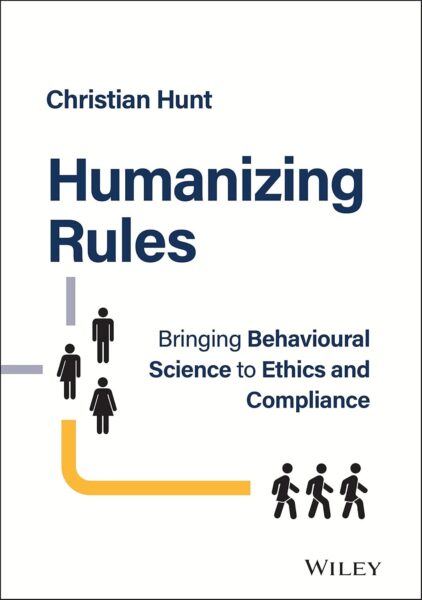 Humanizing Rules – Bringing Behavioural Science to Ethics and Compliance
Humanizing Rules – Bringing Behavioural Science to Ethics and Compliance
by Christian Hunt
220pp., Wiley 2023
Nothing can ruin a good day in the gaming industry as much as learning that you and/or your department are scheduled for a “compliance audit”. It’s akin to a root canal or being notified about a tax audit.
Most would say that compliance is about following the rules, or as the author says, “the risk of people doing things they shouldn’t or not doing things they should.”
In his introduction, Hunt says that most think the two best ways to manage those risks are: 1- “employers have the right to tell their employees what to do and that employees will therefore comply; 2- motivation can come via incentives and noncompliance can be deterred via punishment.”
The entire premise of Hunt’s book is that while those ideas are “theoretically correct,” they often fail in practice. He argues that a better approach is to “humanize our rules”.
This book has numerous tips and suggestions to make those rules better. The book is not geared specifically to the gaming industry, but I believe many ideas presented make sense for us. The entire volume is extremely well researched with every chapter ending with extensive footnotes and references. That is usually a sign that you’re in for a slow and dogmatic read. Nothing can be further from the truth. This book is a very entertaining read. Non-fiction is seldom a page-turner, but this volume comes close due to Hunt’s interesting case studies.
As you might have guessed from his spelling of “Behavioural” in the subtitle, Hunt is British. He also comes from a background in the banking industry, one of the few industries that is even remotely as regulated as gaming. It was during his time at a UK bank when he saw, as almost everyone in the world did, the Academy Awards show in February of 2017.
That was when they read the wrong name for the winner of Best Picture. They announced, “La La Land” when the true winner was “Moonlight”. Hunt calls that his personal “light bulb” moment that changed his career, and it was the major impetus for this book. You’ll love the story of why that mistake happened.
Not only is “humanizing” the first word in the title of this book, Hunt uses the acronym of “H-U-M-A-N-S” to describe six principles for improving ethics and compliance. For example, the “N” is for “Normal”. He says, “the more normal our employees think what we are asking them to do is, the more likely they are to do it.”
HUMANS is followed by six rules that can also improve compliance and ethical behavior. Again, all these chapters share wonderful real-world examples and stories. If you are not already familiar with the “Streisand Effect” you can find the fascinating details under the chapter “Rule Number Six” that says, “Just because you can, doesn’t mean you should.”
Hunt concludes with another acronym called RADAR, which presents another five ideas about how to “influence the decision making of our employees.”
In a recent interview I did with Hunt, he said, “We know that casinos use a broad range (of materials) to grab people’s attention, to get them to do things they wouldn’t otherwise do, to persuade them to change their mind on things. That’s all out there, and not all of that is sophisticated. In fact, if you look at the most successful advertisements, Geico, why would a little gecko sell insurance? It makes no sense whatsoever, and yet it’s clearly very successful. Otherwise, they wouldn’t spend money doing it. So, I think we endow because we think it’s a sophisticated, serious message, we must use a sophisticated, serious toolkit. There will be times when that is entirely appropriate, but there’s other times where we can use a range of different (techniques). So, what I want to do is expand people’s thinking. If you shift your thinking from this is a serious subject and that we need to use serious methods. On the other hand, this can be fun, right? This can be interesting, this can be silly, this can be flippant. And actually, I would argue, the more serious the subject, the more we need to get through to people, right?”
Along that line, the rear cover jacket on this book does the work a disservice when is says, “Author Christian Hunt walks you through the implementation of effective compliance frameworks that work in tandem with common human tendencies.”
Instead of that serious techno-speak that would instantly put off most readers (other than Regulatory wonks), this is a very entertaining book meant for a wide variety of audiences. Regardless of our positions, we all face the challenges of ethics and compliance. Hunt brings his concepts to life, backed by those aforementioned examples.
You can find this book on all the usual sources for $24.95. Amazon has it for $19.34. In digital form, it is $15+ on Kindle and Apple. It is a bit new for the used market, but I did find a few hardcovers under $18.
When you consider the multi-million-dollar fines levied recently in our industry for compliance violations in money laundering, the book is a bargain at 10 times the cover price.
# # #




